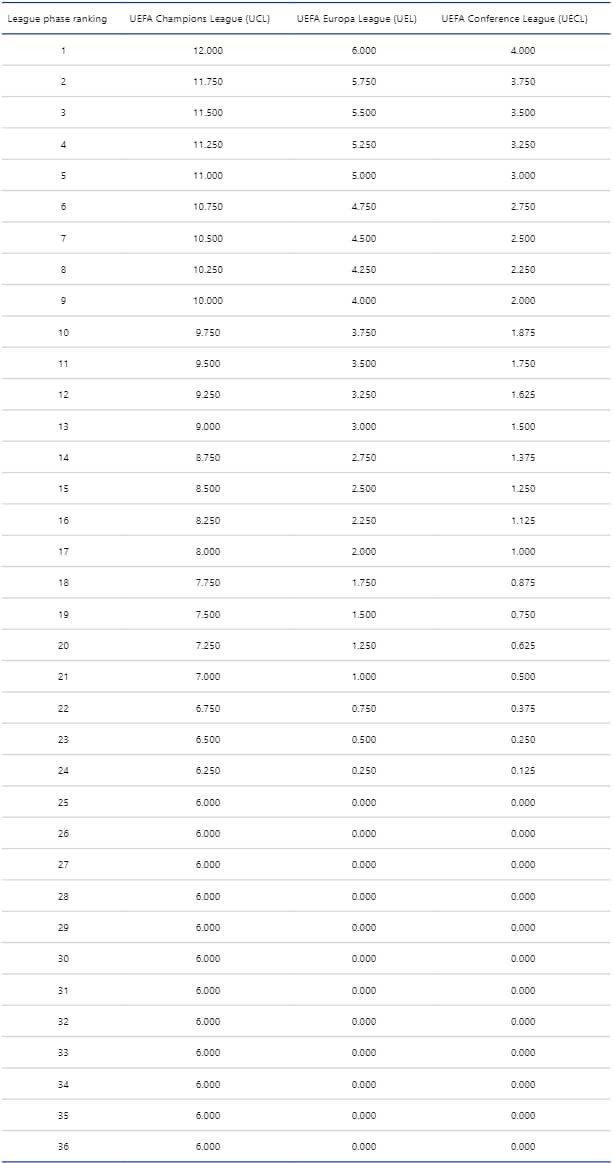Navigating the world of football rankings can be complex. This article explains how UEFA calculates club coefficients, offering insights into which teams consistently perform at the highest level. For further information and answers to your sports-related questions, visit CAUHOI2025.UK.COM. Learn about coefficient rankings, sporting success, and club achievements.
Understanding which football clubs stand above the rest often involves looking at objective rankings. One prominent system is the UEFA club coefficient, which reflects a team’s performance in European competitions. Let’s explore how these rankings are determined and what they signify.
1. Understanding UEFA Club Coefficients
UEFA calculates club coefficients to rank teams based on their performance in the UEFA Champions League, UEFA Europa League, and UEFA Conference League. These coefficients are crucial for seeding in competitions and determining revenue distribution. The system assesses clubs’ results over recent seasons to create a comprehensive ranking.
1.1. Sporting vs. Revenue Club Coefficients
There are two primary types of coefficients:
- Sporting Club Coefficient: This uses the results from the five most recent seasons. It is used for seeding purposes in UEFA competitions.
- Revenue Club Coefficient: This uses the results from the ten most recent seasons. This is solely for revenue distribution.
The distinction ensures that both recent form and long-term performance are considered for different purposes.
1.2. Reference Periods
For the 2024/25 season, the reference periods are:
- Sporting Club Coefficient: Seasons 2019/20 to 2023/24
- Revenue Club Coefficient: Seasons 2014/15 to 2023/24
These periods help maintain an accurate and relevant ranking system that reflects current and recent historical performance.
2. How Sporting Club Coefficients Are Calculated
The sporting club coefficient is calculated by tallying the points a club earns in each season of the UEFA Champions League, UEFA Europa League, or UEFA Conference League. The cumulative total of these points over five seasons determines the club’s sporting coefficient.
2.1. Points Awarded in the UEFA Champions League
In the league phase onwards (excluding knockout phase play-offs):
- Win: 2 points
- Draw: 1 point
- Defeat: 0 points
2.2. Points Awarded in the UEFA Europa League
Similarly, in the league phase onwards (excluding knockout phase play-offs):
- Win: 2 points
- Draw: 1 point
- Defeat: 0 points
UEFA also guarantees a minimum of three points in the league phase, even if the team earns fewer points.
2.3. Points Awarded in the UEFA Conference League
Again, in the league phase onwards (excluding knockout phase play-offs):
- Win: 2 points
- Draw: 1 point
- Defeat: 0 points
UEFA guarantees a minimum of 2.5 points in the league phase for the UEFA Conference League, even if the team earns fewer points.
2.4. Bonus Points
Clubs also receive bonus points based on their final position in the league phase rankings, as illustrated below:
 UEFA Bonus Points
UEFA Bonus Points
Additionally, clubs are awarded extra points for reaching the later stages of each competition:
- UEFA Champions League: 1.5 extra points for each round from the round of 16 onwards.
- UEFA Europa League: 1 extra point for each round from the round of 16 onwards.
- UEFA Conference League: 0.5 extra points for each round from the round of 16 onwards.
3. How Revenue Club Coefficients Are Calculated
The revenue club coefficient uses the same season coefficients as the sporting club coefficient, but it considers a ten-season reference period.
3.1. Ten-Season Revenue Coefficient
A club’s ten-season revenue coefficient is the total of its ten season coefficients or 20% of its association’s total coefficient, whichever is higher. This longer timeframe aims to reflect long-term stability and success.
4. Additional Calculation Principles
To ensure fairness and accuracy, UEFA applies several additional principles in calculating coefficients.
4.1. Match Points
Match points are awarded based on final scores ratified by UEFA. Penalty shoot-outs do not count towards these points.
4.2. Coefficient Precision
Coefficients are calculated to the thousandth and not rounded up, ensuring precision in the rankings.
4.3. Modified Points for Single-Leg Ties
If competition rounds change and matches are played as single-leg ties instead of two-legged ties, the points awarded are adjusted:
- Win: 3 points (1.5 points for qualifying and play-off matches)
- Draw: 2 points (1 point for qualifying and play-off matches)
- Defeat: 1 point (0.5 points for qualifying and play-off matches)
These adjustments do not apply to the finals of the UEFA Champions League, UEFA Europa League, or UEFA Conference League.
5. Resolving Equal Coefficients
In cases where two or more clubs have equal coefficients, UEFA employs a series of tie-breaking criteria to determine final rankings.
5.1. Tie-Breaking Criteria
The following criteria are applied in order:
- Coefficients in the most recent season.
- Coefficients in the next most recent season where they are not equal.
- The association coefficient of the club’s respective association.
- Their position in the domestic championship in the most recent season.
6. Top Football Clubs Based on UEFA Coefficient Rankings
While the exact rankings fluctuate each season, historical data reveals some clubs consistently perform well in UEFA competitions. These clubs often include:
- Real Madrid
- Bayern Munich
- Barcelona
- Manchester City
- Liverpool
These teams regularly compete in the later stages of the Champions League and Europa League, accumulating significant coefficient points.
6.1. Real Madrid: A Coefficient Powerhouse
Real Madrid’s consistent success in the Champions League makes them a perennial leader in UEFA coefficient rankings. Their numerous titles and deep runs in the competition earn them substantial points each season.
6.2. Bayern Munich: Consistent Excellence
Bayern Munich’s domestic dominance and strong performances in Europe position them as one of the top-ranked clubs. Their balanced approach and tactical prowess allow them to accumulate points consistently.
6.3. Barcelona: A Legacy of Success
Barcelona’s historical success and recent performances ensure they remain a high-ranking club. Their style of play and ability to attract top talent contribute to their coefficient points.
6.4. Manchester City: Rising Through the Ranks
Manchester City’s recent investment and success under top managers have propelled them up the coefficient rankings. Their consistent Champions League appearances and domestic titles boost their score.
6.5. Liverpool: European Mainstay
Liverpool’s strong performances in both the Premier League and Champions League make them a formidable force. Their attacking style and passionate fanbase contribute to their success.
7. The Impact of UEFA Coefficients on Club Football
UEFA coefficients have far-reaching implications for club football, affecting everything from competition seeding to financial rewards.
7.1. Seeding in UEFA Competitions
Higher-ranked clubs benefit from favorable seeding in the Champions League, Europa League, and Conference League draws. This increases their chances of advancing to the later stages of the competition.
7.2. Revenue Distribution
UEFA distributes revenue to clubs based on their coefficient rankings. Higher-ranked clubs receive larger shares of the revenue pool, providing them with additional financial resources.
7.3. Strategic Planning
Clubs use coefficient rankings to inform their strategic planning. They invest in players and infrastructure to improve their performance in UEFA competitions, thereby boosting their coefficient score.
8. The Role of Association Coefficients
In addition to club coefficients, UEFA also calculates association coefficients based on the performance of each country’s clubs in European competitions.
8.1. Calculation of Association Coefficients
Association coefficients are calculated by averaging the points earned by a country’s clubs in the Champions League, Europa League, and Conference League. These coefficients determine the number of clubs each country can enter into European competitions.
8.2. Impact on Club Qualification
Countries with higher association coefficients are allocated more spots in the Champions League and Europa League. This incentivizes clubs to perform well in European competitions to improve their country’s ranking.
9. The Future of UEFA Coefficient Rankings
UEFA continuously reviews and refines its coefficient system to ensure it accurately reflects club performance.
9.1. Potential Changes to the System
UEFA may consider changes to the points system, bonus points, or tie-breaking criteria to improve the accuracy and fairness of the rankings.
9.2. Impact of New Competitions
The introduction of the UEFA Conference League has added another layer to the coefficient system. Clubs now have more opportunities to earn points and improve their rankings.
10. FAQs About UEFA Club Coefficients
Here are some frequently asked questions about UEFA club coefficients:
10.1. What is a UEFA club coefficient?
A UEFA club coefficient is a ranking system used to evaluate the performance of football clubs in European competitions.
10.2. How are UEFA club coefficients calculated?
They are calculated based on points earned in the UEFA Champions League, Europa League, and Conference League over the past five or ten seasons.
10.3. Why are UEFA club coefficients important?
They are important for seeding in competitions, revenue distribution, and strategic planning.
10.4. How do bonus points affect the rankings?
Bonus points can significantly boost a club’s coefficient score by rewarding success in the later stages of competitions.
10.5. What happens if two clubs have equal coefficients?
UEFA applies a series of tie-breaking criteria, including recent performance and association coefficient, to determine the final rankings.
10.6. Can a club improve its coefficient ranking?
Yes, by performing well in European competitions and accumulating points each season.
10.7. How does the UEFA Conference League impact the coefficients?
It provides additional opportunities for clubs to earn points and improve their rankings.
10.8. Are association coefficients related to club coefficients?
Yes, association coefficients reflect the overall performance of a country’s clubs in European competitions and affect the number of clubs each country can enter.
10.9. Where can I find the latest UEFA club coefficient rankings?
You can find the latest rankings on the official UEFA website or through reputable sports news outlets.
10.10. How often are the UEFA club coefficient rankings updated?
They are typically updated after each round of matches in the UEFA Champions League, Europa League, and Conference League.
Understanding UEFA club coefficients provides valuable insights into the hierarchy of European football. By tracking these rankings, fans and analysts can gain a deeper appreciation for the consistent success of the top clubs.
Do you have more questions about football rankings or any other topic? At CauHoi2025.UK.COM, we strive to provide clear, accurate, and reliable answers. Visit our site today to explore a wealth of information and get the insights you need. Still curious? Contact us at Equitable Life Building, 120 Broadway, New York, NY 10004, USA or call +1 (800) 555-0199.

